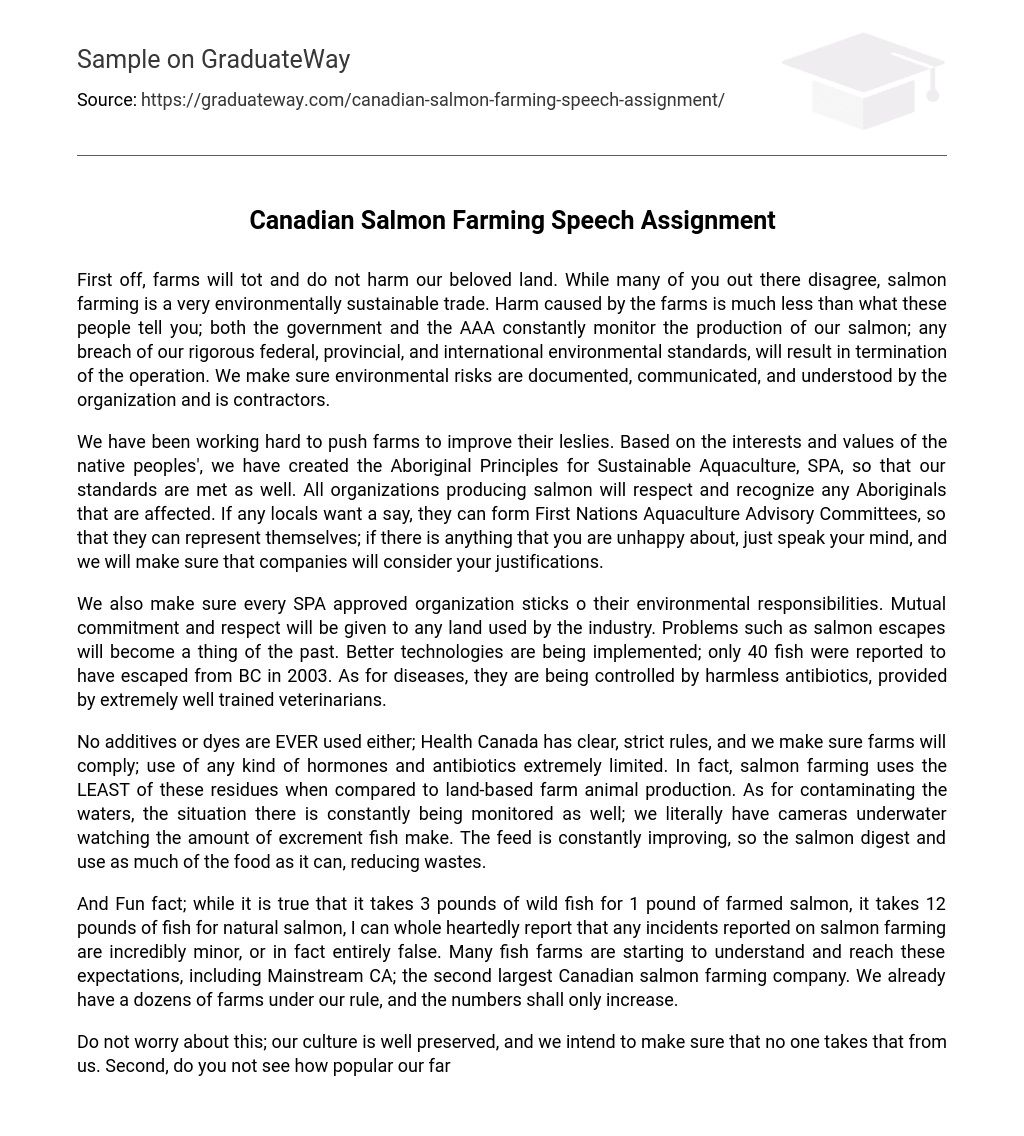First off, farms will tot and do not harm our beloved land. While many of you out there disagree, salmon farming is a very environmentally sustainable trade. Harm caused by the farms is much less than what these people tell you; both the government and the AAA constantly monitor the production of our salmon; any breach of our rigorous federal, provincial, and international environmental standards, will result in termination of the operation. We make sure environmental risks are documented, communicated, and understood by the organization and is contractors.
We have been working hard to push farms to improve their leslies. Based on the interests and values of the native peoples’, we have created the Aboriginal Principles for Sustainable Aquaculture, SPA, so that our standards are met as well. All organizations producing salmon will respect and recognize any Aboriginals that are affected. If any locals want a say, they can form First Nations Aquaculture Advisory Committees, so that they can represent themselves; if there is anything that you are unhappy about, just speak your mind, and we will make sure that companies will consider your justifications.
We also make sure every SPA approved organization sticks o their environmental responsibilities. Mutual commitment and respect will be given to any land used by the industry. Problems such as salmon escapes will become a thing of the past. Better technologies are being implemented; only 40 fish were reported to have escaped from BC in 2003. As for diseases, they are being controlled by harmless antibiotics, provided by extremely well trained veterinarians.
No additives or dyes are EVER used either; Health Canada has clear, strict rules, and we make sure farms will comply; use of any kind of hormones and antibiotics extremely limited. In fact, salmon farming uses the LEAST of these residues when compared to land-based farm animal production. As for contaminating the waters, the situation there is constantly being monitored as well; we literally have cameras underwater watching the amount of excrement fish make. The feed is constantly improving, so the salmon digest and use as much of the food as it can, reducing wastes.
And Fun fact; while it is true that it takes 3 pounds of wild fish for 1 pound of farmed salmon, it takes 12 pounds of fish for natural salmon, I can whole heartedly report that any incidents reported on salmon farming are incredibly minor, or in fact entirely false. Many fish farms are starting to understand and reach these expectations, including Mainstream CA; the second largest Canadian salmon farming company. We already have a dozens of farms under our rule, and the numbers shall only increase.
Do not worry about this; our culture is well preserved, and we intend to make sure that no one takes that from us. Second, do you not see how popular our farmed salmon has become? It is easily PC’s biggest agricultural export, and demand is ever growing. It provides 447 million dollars of GAP! You can’t get nearly the same amount from naturally fishing; in fact, the number of wild almond stocks have significantly dropped over the last few decades, mostly due to overfeeding! If we really want to protect our land, salmon farming will reduce the amount of decline.
And honestly now; Canadian farmed salmon have become so popular, if we were to remove it from our markets, people would simply resort to SHIPPING foreign salmon from elsewhere, where laws would be less strict, and would be overall more harmful to our Earth. Now finally, because the industry is so massive right now, it provides us a chance for us to get a much needed boost to the economy. Many Native Americans are unemployed, 18% compared to the . 5% of non-aboriginal Canadians. We also receive less average income.
On top of that, one third of the Aboriginal population is under 15, a much larger amount than from other ethnic cultures; this means there will be a huge demand for jobs in the upcoming future. Salmon Farming in BC already provides over 6000 jobs! Salmon can be raised throughout the year, meaning full-time employment. All workers are treated well, making fair wages, each with equal opportunities of employment. There is also a variety of benefits given to workers, including risk-control programs in case any person gets ill. Each member is safe, and full training is given before any work.
This is a wonderful opportunity! Salmon farming just needs to be pushed in the right direction, not ended. There is simply too much that can be provided. Now, of course there are still some downsides, but what doesn’t in this life? Believe me, much thought and planning have been put into this industry. The goods of these operations far out pass any downsides; friends, I’m here to make sure we can all benefit from this. Both fish farming and our culture can co-exist peacefully. Support salmon farming, and support a better future for Aboriginals!





